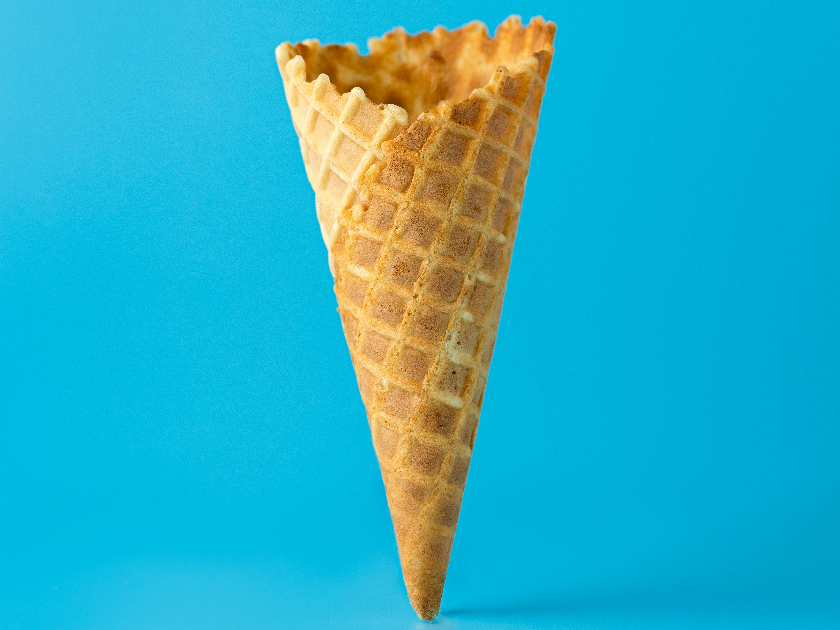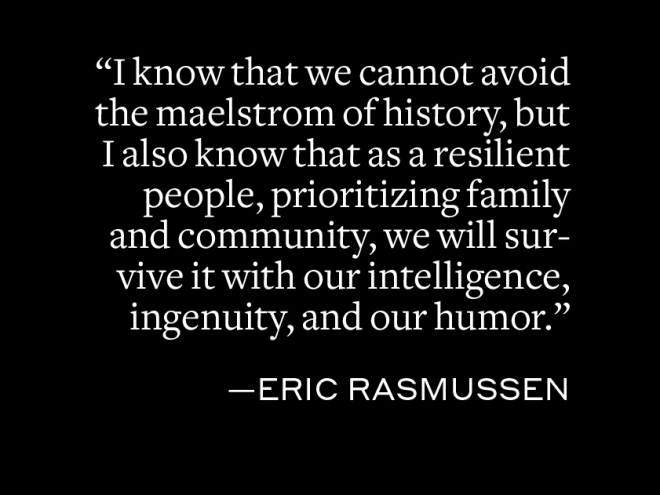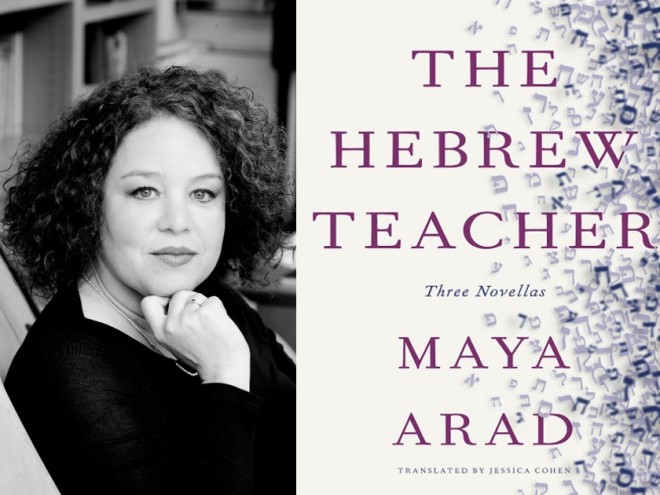The idea was to go get ice cream. It was a warm afternoon, and Dodo was leaving in the morning. What better way to say “Good-bye, see you never” than walking over together to the ice cream shop that we’d loved since we were little kids?
Mom, still holding on to the act that nothing extraordinary was happening, asked us to move the garbage bins outside, from the garage to the curb. I rolled the trash bin out, and then returned for the compost, because Dodo got stuck on the recycling: apparently, in honor of his departure, Mom had placed a stack of his old clothes on top of the bin, and, now, he wouldn’t be satisfied until he looked through all of it. Finally, he rescued an old cap, put it on, and applied himself to the recycling bin that clanked with glass bottles and aluminum cans as Dodo dragged it up the driveway. Standing on the sidewalk, he took off the cap and showed it to me.
“See? Goodwill Games, 1994. Dedushka must’ve brought it from Moscow.”
“And the clothes?”
“Oh yeah.”
He fixed the filthy blue cap on his head, returned to the dark shadows of the garage, emerged holding a cardboard box he had packed with the clothes, and took stock. “Too much trash. So wasteful.”
“I’m going to scream,” I said, and I did scream, filling the lovely residential street where we’d grown up with all the pieces of our shared past that he was breaking. I hadn’t had a scream so satisfying in a decade, when I was seven and he was eleven and he and I screamed simply for fun.
“I agree,” Dodo said, smiling at me. I could tell that he was smiling even though half of his face was obscured by a COVID-19 mask.
Two doors down, a neighbor’s baby started crying. Mom’s nemesis from across the street came out onto the porch to see what was going on, but, seeing me unmasked, wrinkled her brow and went back in. I pulled my N95 up to cover my nose and mouth. We were a year into the pandemic. When, I wondered, was San Francisco going to catch up with the rest of the country, and start letting people walk around unmasked, outside?
Dodo and I started down the street, taking large steps to avoid stepping on the lines separating blocks of concrete sidewalk. We passed our neighbor’s bottlebrush tree with a miniature fairy house arranged at its base, the house with pink and red roses blooming in the front yard, and then turned the corner to the street where all the cafes and dim sum shops had thrived before the pandemic.
On the way to the ice cream shop, there was a new hummus place that had popped up just as the lockdown was ending the previous summer. The owner, Gilad, had started up in the Richmond District as others were shutting down, somehow earning the reputation of the best Israeli hummus to be had anywhere in San Francisco. He made enough money during the lockdown making home deliveries of pints of his homemade hummus to justify opening a storefront on Clement Street in the heart of this formerly bustling neighborhood stretching along the northwest corner of San Francisco, just north of the Golden Gate Park. As Dodo and I walked by, the line to Gilad’s was around the corner. Nevertheless, Gilad, working the cash register on a counter set up to block the doorway, spotted Dodo and gave him a wave.
“Thanks for defending our homeland,” Gilad yelled over the masked and still socially-distanced crowd — each patron was standing on footprints painted six feet apart along the sidewalk — and then I heard him explain to the customers at the very front about how Dodo had volunteered for the IDF and was going to Israel. Even though he himself had left Israel years ago, apparently, he thought Dodo was doing a good deed. I felt another scream building up inside my ribcage.
Dodo, proud of himself, started whistling. After a few beats, I realized it was the International that Mom sang for many years to wake us up. “Arise, the wretched proletariat,” the march began with a heavy-handed solemnity, somehow intensified in the Russian that Mom always used when singing it for us. Vstavai, prokliat’em zakleimennyi … But blaming Mom for Dodo’s stupidity was too easy.
“You’ll whistle away all your money,” I told Dodo, channeling Babushka’s superstition.
He smiled, but didn’t stop making the noise until we crossed the street and passed several closed dim sum parlors before reaching the doors of the ice cream shop.
The extended lockdown had played a cruel game on people. Now that things were finally opening back up, everyone wanted novelty. The old ice cream shop, once a crowded neighborhood draw, was empty at 2 pm. Stepping up to the register that blocked the doorway, Dodo asked for his usual scoop of vanilla on a sugar cone, and I got a scoop of chocolate caramel on top of the grasshopper pie. It was going to be a long summer, alone in our old house with Mom, before I would be off to college in New York, and I needed fat to survive this.
The extended lockdown had played a cruel game on people. Now that things were finally opening back up, everyone wanted novelty.
We didn’t even make it back to the hummus shop before Dodo finished his ice cream and was begging me for a lick of mine.
Not even begging, but grabbing my wrist, shoving his face in and taking a bite off the top.
I wrenched my ice cream away and stepped behind a tree.
“Come on, Lana. Just one lick! I’ll be your puppy,” he said, following me, mask hanging down his chin, splotches of vanilla atop the scraps of blonde facial hair. He was nearly a foot taller than me and though he was usually gentle enough, he wasn’t going to leave me alone. I turned my back, but his stick arms easily reached around my torso to grab at the cone.
I considered smushing the ice cream into his face, or throwing it against the pavement. Either way, he wasn’t going to let me enjoy it at my own pace. I took a pretend ball out of my pocket and threw it down the street. “Fetch!”
He chased after it, stooped, pretending to pick it up, then came running back.
“Here you go! May I have a lick now?”
I angled the cone in his direction. He bit a big chunk off the top, and then decided to dance. This was a familiar shtick. Dodo called it his “dance,” but it was more like a mime show. For as long as I knew him, he’d been perfecting this act he called “Running for President.” It involved a lot of jumping around, running in place, and waving his hands, randomly.
Now, as I stood beside the tree, people walking by started slowing down and staring at him, to see what was wrong. Dodo, perhaps sensing opportunity, immediately took off his Goodwill Games 1994 cap and turned it over, “Give me some change?”
He tried one passerby. Then another. A moment later, he returned his empty cap to his head and sidled up to me making puppy dog eyes. I didn’t have a choice but to let him finish my treat.
He popped the last bite of my cone in his mouth and immediately pulled on his mask. Dodo, so disorganized when left to his own devices, followed all of the COVID-19 regulations to the letter – always wear a mask outside, stand precisely six feet apart in any line, wash hands for the length of time it takes to sing Happy Birthday twice over – and I secretly believed he was actually joining IDF because he was more scared of dying a horrible death on a ventilator than going to war. He loved that Israel forced all of its citizens to vaccinate. My brother had never adjusted to the life outside of his public school. College had felt too permissive to him. He had religiously adopted COVID-19 guidelines from the CDC, as fast as they’d been issued. Dodo had always done better when there were rules from an established authority that he could follow.
My mask back on, I trailed after him the rest of the way home. I didn’t want this walk to end, but I couldn’t think of anything to say that would hold him back. I wished that I still believed in asking the little fairy from under the neighbor’s tree for help.
“Did you have fun?” he asked me, earnestly, as we were steps away from our door.
I didn’t respond, and he tried again: “I want you to have this hat and think of me.”
He tried to hand me the stupid cap, but I shirked away from it.
“No, thank you.”
“You should have it.”
He jumped up to me and plopped the cap on top of my head with force, then ran up the stairs, yelling, “Mom, Mom!” I didn’t know what he possibly could’ve needed from her that urgently, and I worried about Mom who was about to tear the house apart from the stress of trying to pretend today was a day like any other. I didn’t follow him inside, but sat on the stone stair. My mask off, I could smell the roses from down the street and the asphalt dust hanging in the air. I wondered what ice cream flavor I would’ve picked had I not expected Dodo to eat half of it, and I couldn’t decide.
I stared at the cap in my lap, noticing its frayed edges, and imagined taking it to college with me, a constant reminder of Dodo in danger half a world away. For him, it was a moment’s inspiration to hand it to me that meant nothing, but I’d be stuck treasuring it for years to come, like Mom had before me. I glanced up at the recycling bin on the curb, then back again at the hat held on my lap. I shifted on the step, as if to stand.
“Hey, have you seen my old sneakers?” Dodo was back at the door, yelling, as always when he needed something simple. “I decided to take them instead of the new ones. And, come, Mom’s freaking out again about the suicide I’m committing and all that.”
“Stay,” I told him. “Don’t go. This is stupid and wrong.”
“Fine, I won’t go, but come. Mom’s taking stuff out from my backpack.”
“I’m on her side.”
“Go tell her that.”
He grabbed me by the hand and tried to pull me inside the house, but I was ready for him. I flung the hat aside and hooked my arm around the iron railing, letting the metal tear into my flesh as I held on. Dodo was strong, but I was persistent, and I was in the right. Soon, very soon, he had to figure out how to solve his problems without my help.
Olga Zilberbourg’s English-language debut Like Water and Other Stories (WTAW Press) explores “bicultural identity hilariously, poignantly,” according to The Moscow Times. It also deals with bisexuality and immigrant parenthood. Zilberbourg’s writing has appeared in Narrative Magazine, World Literature Today, Confrontation, Electric Literature, Lit Hub, Alaska Quarterly Review, and elsewhere. Born in Leningrad, USSR, in a Russian-speaking Jewish family, she makes her home in San Francisco, California where she co-facilitates the San Francisco Writers Workshop. Together with Yelena Furman, she has co-founded Punctured Lines, a feminist blog about literatures from the former Soviet Union. She is currently at work on her first novel.




